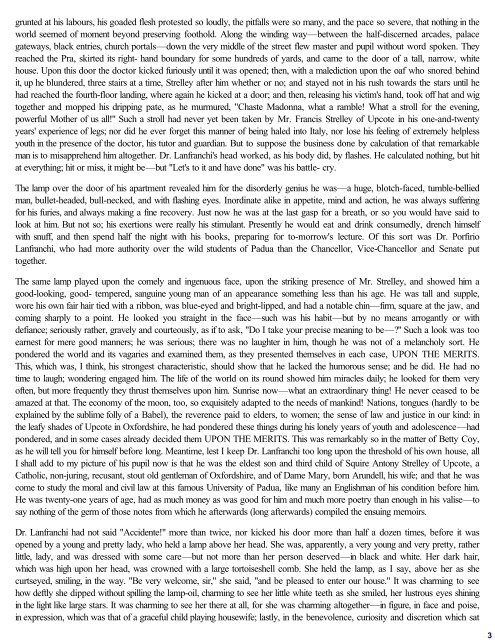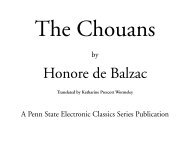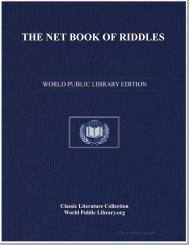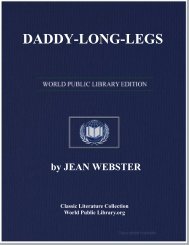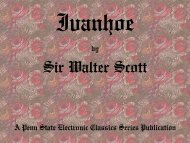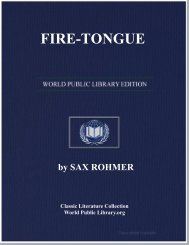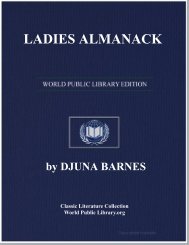THE FOOL ERRANT - World eBook Library - World Public Library
THE FOOL ERRANT - World eBook Library - World Public Library
THE FOOL ERRANT - World eBook Library - World Public Library
Create successful ePaper yourself
Turn your PDF publications into a flip-book with our unique Google optimized e-Paper software.
grunted at his labours, his goaded flesh protested so loudly, the pitfalls were so many, and the pace so severe, that nothing in the<br />
world seemed of moment beyond preserving foothold. Along the winding way—between the half-discerned arcades, palace<br />
gateways, black entries, church portals—down the very middle of the street flew master and pupil without word spoken. They<br />
reached the Pra, skirted its right- hand boundary for some hundreds of yards, and came to the door of a tall, narrow, white<br />
house. Upon this door the doctor kicked furiously until it was opened; then, with a malediction upon the oaf who snored behind<br />
it, up he blundered, three stairs at a time, Strelley after him whether or no; and stayed not in his rush towards the stars until he<br />
had reached the fourth-floor landing, where again he kicked at a door; and then, releasing his victim's hand, took off hat and wig<br />
together and mopped his dripping pate, as he murmured, "Chaste Madonna, what a ramble! What a stroll for the evening,<br />
powerful Mother of us all!" Such a stroll had never yet been taken by Mr. Francis Strelley of Upcote in his one-and-twenty<br />
years' experience of legs; nor did he ever forget this manner of being haled into Italy, nor lose his feeling of extremely helpless<br />
youth in the presence of the doctor, his tutor and guardian. But to suppose the business done by calculation of that remarkable<br />
man is to misapprehend him altogether. Dr. Lanfranchi's head worked, as his body did, by flashes. He calculated nothing, but hit<br />
at everything; hit or miss, it might be—but "Let's to it and have done" was his battle- cry.<br />
The lamp over the door of his apartment revealed him for the disorderly genius he was—a huge, blotch-faced, tumble-bellied<br />
man, bullet-headed, bull-necked, and with flashing eyes. Inordinate alike in appetite, mind and action, he was always suffering<br />
for his furies, and always making a fine recovery. Just now he was at the last gasp for a breath, or so you would have said to<br />
look at him. But not so; his exertions were really his stimulant. Presently he would eat and drink consumedly, drench himself<br />
with snuff, and then spend half the night with his books, preparing for to-morrow's lecture. Of this sort was Dr. Porfirio<br />
Lanfranchi, who had more authority over the wild students of Padua than the Chancellor, Vice-Chancellor and Senate put<br />
together.<br />
The same lamp played upon the comely and ingenuous face, upon the striking presence of Mr. Strelley, and showed him a<br />
good-looking, good- tempered, sanguine young man of an appearance something less than his age. He was tall and supple,<br />
wore his own fair hair tied with a ribbon, was blue-eyed and bright-lipped, and had a notable chin—firm, square at the jaw, and<br />
coming sharply to a point. He looked you straight in the face—such was his habit—but by no means arrogantly or with<br />
defiance; seriously rather, gravely and courteously, as if to ask, "Do I take your precise meaning to be—?" Such a look was too<br />
earnest for mere good manners; he was serious; there was no laughter in him, though he was not of a melancholy sort. He<br />
pondered the world and its vagaries and examined them, as they presented themselves in each case, UPON <strong>THE</strong> MERITS.<br />
This, which was, I think, his strongest characteristic, should show that he lacked the humorous sense; and he did. He had no<br />
time to laugh; wondering engaged him. The life of the world on its round showed him miracles daily; he looked for them very<br />
often, but more frequently they thrust themselves upon him. Sunrise now—what an extraordinary thing! He never ceased to be<br />
amazed at that. The economy of the moon, too, so exquisitely adapted to the needs of mankind! Nations, tongues (hardly to be<br />
explained by the sublime folly of a Babel), the reverence paid to elders, to women; the sense of law and justice in our kind: in<br />
the leafy shades of Upcote in Oxfordshire, he had pondered these things during his lonely years of youth and adolescence—had<br />
pondered, and in some cases already decided them UPON <strong>THE</strong> MERITS. This was remarkably so in the matter of Betty Coy,<br />
as he will tell you for himself before long. Meantime, lest I keep Dr. Lanfranchi too long upon the threshold of his own house, all<br />
I shall add to my picture of his pupil now is that he was the eldest son and third child of Squire Antony Strelley of Upcote, a<br />
Catholic, non-juring, recusant, stout old gentleman of Oxfordshire, and of Dame Mary, born Arundell, his wife; and that he was<br />
come to study the moral and civil law at this famous University of Padua, like many an Englishman of his condition before him.<br />
He was twenty-one years of age, had as much money as was good for him and much more poetry than enough in his valise—to<br />
say nothing of the germ of those notes from which he afterwards (long afterwards) compiled the ensuing memoirs.<br />
Dr. Lanfranchi had not said "Accidente!" more than twice, nor kicked his door more than half a dozen times, before it was<br />
opened by a young and pretty lady, who held a lamp above her head. She was, apparently, a very young and very pretty, rather<br />
little, lady, and was dressed with some care—but not more than her person deserved—in black and white. Her dark hair,<br />
which was high upon her head, was crowned with a large tortoiseshell comb. She held the lamp, as I say, above her as she<br />
curtseyed, smiling, in the way. "Be very welcome, sir," she said, "and be pleased to enter our house." It was charming to see<br />
how deftly she dipped without spilling the lamp-oil, charming to see her little white teeth as she smiled, her lustrous eyes shining<br />
in the light like large stars. It was charming to see her there at all, for she was charming altogether—in figure, in face and poise,<br />
in expression, which was that of a graceful child playing housewife; lastly, in the benevolence, curiosity and discretion which sat<br />
3


